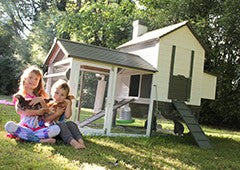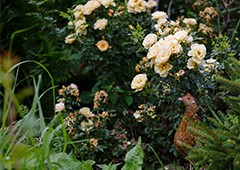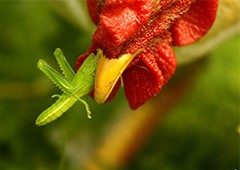Do you get absolutely giddy with glee when you think about gardening? Does your green thumb itch with envy when you see early bird neighbours who got a head start growing their seeds indoors? Well, summertime, in its wonderfully sunny splendour, is great for gardens. So, if you dig digging, don your favourite sun hat and garden gloves - we’re unearthing some great tips for summer gardening success.
Be Summer Savvy
The most important tip for summer gardening success is to be prepared. Slather yourself with sunscreen before heading outdoors to garden for prolonged periods. Prevention is the best medicine. Gardening is all the more enjoyable if you can weather the weather without sunburn. And, to keep bugs at bay, let the first plants you grow be ones that repel pests! Plant Pennyroyal, Basil, Catnip, Chives, Marigolds, and pretty Petunias to ward off pesky pests that want to buzz in your ear or worse yet, sting or bite. Dig into a bug free zone and smile all the while gardening!
Superhero Strength Soil Helps Seedlings to Soar
Your vegetables will grow vigorously when living in the right environment. The key element “underneath” great vegetable and flower gardens is superhero strength soil! While building up your soil to superhero strength is not complicated, it does take some time and effort. Simply add organic matter such as rotting leaves, wood ash, or the crème de la crème of organic matter, compost. Organic matter adds essential nutrients to your garden soil and encourages a myriad of microorganisms to call your soil home. The more microorganisms, the merrier your vegetables will be!
Go Organic
Go organic all the way! Organically grown vegetables and flowers are healthier, more nutrient rich, and also grow more vigorously. Now, although organic vegetables may not require regular fertilizing because you have superhero soil, the extreme temperatures in a typical Australian summer may make feeding your plants each month necessary. Some organically rich feeding solutions are liquid or dry kelp, bone and blood meal, fish emulsion, and rock phosphate. And, organic fertilizers enrich your already great soil even more, as opposed to inorganic chemical fertilizers which only deplete vital microorganisms and nutrients.
Perfect Plants for the Perfect Garden
Summertime weather in Australia is, well, quite fickle. Fruit and vegetable plants need to be hardy and well suited to your area. Got chickens? Then be sure to plant some delicious chook friendly plants. Check out this list of suitable summer plants for your area:
Subtropical Areas (Southeast Qld and Northern NSW)-artichokes, celery, beans, cucumbers, eggplant, squash, onions, leeks, lettuce, kohlrabi, sweet corn, tomatoes, and sweet potatoes
Tropical Areas (North QLD, NT, and WA)-artichokes, cauliflower, celery, cucumbers, eggplant, lettuce, pumpkins, radishes, tomatoes, and shallots
Temperate Areas (Sydney, Coastal, NSW and Victoria)-beans, broccoli, cabbage, carrots, cauliflower, celery, cucumbers, eggplant, endive, kohlrabi, leeks, lettuce, potatoes, okra, radishes, rhubarb, sweet corn, sweet potatoes, and zucchini
Cold & Southern Tablelands(Melbourne, Tasmania and Cool Highlands)-beans, cabbage, carrots, cauliflower ,cucumbers, kohlrabi leeks, lettuce, onions, parsnips, radishes, pumpkins, sweet corn, turnips, tomatoes, and zucchini
Mediterranean Area (Adelaide and Perth)-plant tomatoes and zucchini no later than the end of January
Water and Mulch-the Dynamic Duo
When it comes to gardening, water and mulch go hand in hand. Water plays a vital role in growing gorgeous lush vegetable gardens in summer. Mulch is like a warm sweater on a cold day-it helps keep our body heat in. Mulching your garden exponentially increases the moisture content of your garden soil while also helping to keep weeds at bay. That’s definitely a win-win situation!
The best time to water plants, whether new sprouts or already established plants, is first thing in the morning or evening. Watering at sunup and sundown allows your soil to absorb so much more water than if you were to water during the afternoon when the sun is highest in the sky and hottest. In cases of extreme heat and dryness, you may find it necessary to water your garden both times of day.
Remember to keep yourself hydrated as well. Keep yourself from becoming a weak wilting gardener by keeping a water bottle by your side.

Chooks Dig Gardening
Are your chooks hooked on gardening? Send your chummy chooks an open invitation to garden alongside you and you will dig gardening! Chickens make great gardening pals. Not only will they chat with you and keep you company, they’ll devour any and every weed, pesky insect pests, and drop off some mighty manure, as well as, scratch it into your garden soil. If you’re concerned that your feathery friends may get a bit too overzealous in your garden and trample or peck at wee saplings, “Don’t worry, beak happy”-protect young sprouts with netting, cloches, or wire cages.
So, warm up that green thumb and get digging! The sooner you get started, the sooner your table will be filled to overflowing a delicious bounty of homegrown vegetables, fruits, and herbs.


















